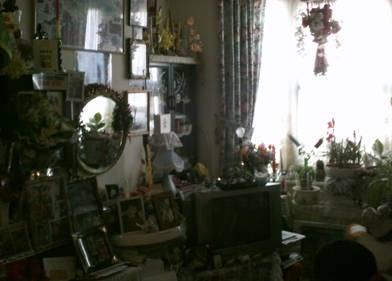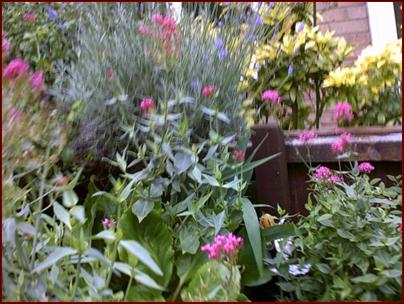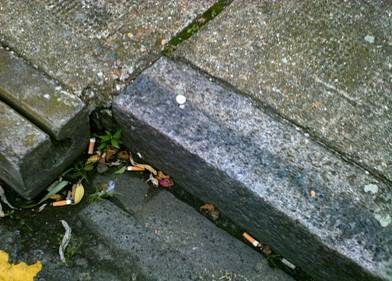Case 19: Ruby
Social, cultural and historical context
Ruby is a 79-year-old woman, originally from Jamaica, who came to the UK 50 years ago. Her husband, a builder, had emigrated a few years earlier and she joined him with their children (they had four in total, and 15 grandchildren). She worked as a homemaker when her children were growing up. She divorced 37 years ago and her ex-husband died five years later, having returned to Jamaica. She now lives alone in a small terraced house owned by a housing association where she has been for 24 years.
Participant's experience of ageing and ill health
Ruby's medical history includes blindness in one eye from a vascular event 20 years ago (and more generally, difficulty reading and a tendency for her eyes to "get tired"), arthritis (particularly of her knees, which makes climbing stairs difficult), high blood pressure (caused, she believes, by the stress of a noisy neighbour, but now well controlled), depression and stress, and high cholesterol. She receives Disability Living Allowance.
She also has a history of falls. The first was from a bus four years ago. The bus moved off before she had a firm hand hold; she was badly bruised. The second fall occurred at home at the bottom of the stairs while descending, two or three years ago. She was able to get up from the floor and went round to her GP. She says she lost confidence for a while even though she didn't break any bones. She was referred to the falls clinic at the day hospital, assessed and some modifications (e.g. rails) were made to her home; she has not fallen since. She still attends the day hospital, from which she was recruited to the ATHENE study.
Generally, Ruby is fairly independent with her activities of daily living, but sometimes she feels she needs help. This seems to be because of intermittent bouts of low mood and/or loss of confidence:
"Even the other day I was so ill, and I said oh God I don't know what to do or who to turn to. I remember once I was there and I was really, and I phoned the social services, and they told me we don't do that anymore, I said not even someone to talk to? And they said no. [...] And I was really down. [...] I would rather die than call them [now], cause I don't get any help from them."
This pattern of struggling on, interrupted by periods of acute deterioration for which she needs (but allegedly does not receive) help, is a recurring theme in Ruby's narrative. She recalls the time she lost sight in one eye and spent ages on the phone to the council. A home visit was promised but did not materialise. Later, the hospital specialist wrote to the council and then they did phone to offer counselling. Ruby recalls that she pulled through on her own inner resources and when the counsellor eventually visited, "...she said, oh, you're stronger than my mother. And I said yeah, why should I go to pieces because of you didn't come to help me? No."
Ruby takes a number of long-term medications for her medical conditions and also takes a proprietary vitamin-iron tonic, which she buys. She says that in Jamaica people would go out into the bushes and pick herbs to make a tonic.
People in this participant's life
Three of Ruby's children live within an hour or two's drive. The fourth, a son, lives about 4 miles away. This son has recently been treated for cancer, and whilst Ruby nursed him through chemotherapy and he is now much better, this experience has "worn her out". She cooks him lunch on Sundays and he sometimes visits during the week as well. She sees two of the other children regularly but the other is "distant" and has little contact with her.
As well as her own immediate family, Ruby has a niece of whom she is extremely fond and who visits regularly. She used to work in social care as some kind of community worker (now made redundant) and advises Ruby on services. She phoned the local authority to refer Ruby for an occupational therapy assessment for a bath lift when she saw the difficulty she was having with getting in and out of the bath.

The living room with numerous family photographs (photo taken by Ruby)
Ruby's sister died suddenly and unexpectedly recently in Jamaica and she is still upset about this ("it shook me up, because she hadn't been ill"). She went to Jamaica for the funeral. Her remaining four siblings all live abroad and she rarely hears from them.
Ruby names a few neighbours and local friends who are "very nice". Her closest friends are all originally from Jamaica. But she says she is a private person who does not want or need a large circle of friends:
"I don't really keep a lot of friends you know. Cause friends are not very nice, some friends. They just nosy in your business, and I wasn't brought up that way."
What matters to this participant?
Ruby is very happy to take part in the research study: she says she enjoys talking to people and having company. She says she is not very well overall, but struggles on. In the research visits, she is full of life, laughing and talking most of the time. Her house is welcoming and homely, with dozens of family photographs on display.
Family matters to Ruby. She is a popular cook and hostess for her family members ("I see them as often as I can, as they want to, because they always come to get their food"). She is very hospitable to the researcher, offering refreshments as soon as he arrives. As well as cooking, her favourite activities are cleaning her home and tending the garden - she says this is what keeps her alive. She can't stand mess, and would prefer to move to a smaller flat which would be easier to keep clean. Her garden is small but neat and well-kept and full of bright flowers (it was a "complete mess" when she moved here and has taken years of work to get it to this state), though she says she can no longer garden to the standard she used to because of the arthritis. She grows herbs to use in cooking.

Plants and herbs in Ruby's garden (photos taken by her)
Eating home-cooked, fresh food is important for Ruby, who considers that health comes from what you eat ("I do take care of my body. I don't eat any rubbish"). She cooks in a very healthy way, removing all the fat from chickens, skimming off fat from the top of soups and stews and meat cooked overnight, steaming vegetables, recycling water used for cooking cabbage (which contains "all the goodness") and making gravy with it. She learnt this from her auntie, who was a top cook. She bemoans the poor quality of fruit and vegetables in England, and contrasts this with how abundant her sister's house in Jamaica is - with home-grown avocadoes, mangoes, pears, sugar cane and oranges.
Ruby loves African-Caribbean music, which is often playing in the house. She watches TV, maybe for several hours per day - soaps, quiz shows and so on. She also enjoys reading, particularly books about home food remedies for medical conditions. By way of an example, she suggests that cinnamon is good for diabetes.
Ruby greatly values her GP, who she describes as "wonderful". The GP apparently does not feel she is sufficiently depressed to need antidepressants. She also remembers her attendance and treatment at the Day Hospital with affection - she thinks the staff were excellent and she benefitted greatly from the services there, especially regarding falls prevention and the stair rail that was installed via the housing association.
Ruby is keen on charities and donates regularly to several, including those for heart disease and cancer.
She is extremely fond of her native Jamaica. She describes an idyllic childhood ("poor but happy") and spends a long time showing the researcher old photographs of her home village and extended family. She says the warm climate is good for her knees and she would like to return there permanently, though she recognises that this would be logistically difficult as her children are all in the UK.
Ruby used to enjoy going to the local day centre for African Caribbean elders, but a few months ago she heard someone giving a talk that offended her so she stopped going and has not been since. Now she stays at home most of the time - or if she goes out, she sits in the park or goes for a ride on the bus.
"I did not come here [the African-Caribbean day centre] to listen to no rubbish in this club. If I want to listen to rubbish I stay indoors. [...] And from that day I said no more, I'm not going back there. I can stay in my house and I can play my little music, and I can watch my little television, whatever I wish to watch. But music is my love."
Ruby says there are major problems with illegal drugs (crack cocaine, marijuana), noise and crime in the neighbourhood. She asked to be moved to a bungalow some time ago (10 years or more) but the Housing Association said no, she did not meet the criteria. Now the housing association is asking her to move (perhaps because the house is under-occupied). She has said no, I am here to stay now, despite getting up the stairs being more difficult due to knee pain.

Curb near Ruby's home where young people smoke (photo taken by Ruby)
Technologies in this participant's home and life
Ruby's main way of keeping in touch with her children and grandchildren is the telephone. She has a landline and three cordless handsets in various rooms. She does not have, or want, a mobile phone. Whilst her children have offered to buy her one, she is concerned that it will make her a target for pickpockets (she once had her purse stolen in the market), and she also feels she is "not a phone person".
Ruby was provided with telecare a few years ago as a result of the falls; initially she had a pendant alarm and control unit, and later environmental sensors (flood and smoke detectors) were added. She recently sent all these back, however, when charges were introduced. She agrees that a mobile alarm might be useful for when she is out of doors. She does not want telehealth (e.g. to monitor her blood pressure) because she enjoys going out to see her GP.
Materiality and capability
Ruby says she has difficulty with all the things she loves now - cooking (because the heat from the cooker affects her bad eye), gardening and housework (because of the arthritis and tiredness). She has not stopped these activities, but has curtailed them and everything takes much longer.
"Getting older. One eye all these years. Must be tired...But I'm not going to stop. I must do something."
Ruby's house is fairly well adapted for her current needs by means of assistive devices. However, it is much larger than she needs and the stairs (with upstairs bedroom but downstairs bathroom) are not ideal. Ruby can now empty and clean her own commode but may not be able to do this if her arthritis gets worse. The house is very cold in winter as the central heating does not work too well. There is quite a bit of clutter (such as old furniture, plant pots and so on) in the house, which she intends to clear out sometime.
Ruby appears to be technically skilled and confident. She understood all the telecare devices which she had had in her house, and gave an accurate account of how they worked. When she is given the research camera, Ruby is very keen to learn to use it, and learns very quickly. She takes many photographs (though she does not complete the scrapbook). She says she used to have a digital camera but lost it somewhere.
The researcher asks why the environmental sensors were fitted, and Ruby replies that she did not ask for them; it was "because I am getting old and they think I am useless". This contrasted with Ruby's own perception of herself: "I am not a weak person you know. I am just like my mother [who lived to 103] and my daddy [who lived to 92]. Strong."
Real incidents of using (or choosing not to use) an ALT
Ruby never used the telecare. She returned the equipment because she felt the charges (3 pounds per week) were unreasonable since she had not used any of the devices in seven years. She says that the pendant alarm did provide peace of mind, knowing that it was there, but that she never actually got any use out it. Her niece offered to pay for the telecare but Ruby declined. However, she has kept an advertisement from Age UK for its stand-alone telecare service on which she has written "enquire about this - is it free?".
Once, Ruby got stuck in the bath because she forgot to charge up the battery of the bath lift. She had to struggle out, which was very difficult with her painful knee. She managed but had no-one to call. Since then, she keeps a phone in the bathroom with her in case.
Comment
This case illustrates a number of recurring themes in this sample: the insidious influence of multi-morbidity and non-specific tiredness on the ability to live independently; the importance of family in preventing social isolation; the importance of doing things and making things (in Ruby's case, cooking, gardening and taking care of her sick son) for providing value and fulfilment in an older person's life; the variability in people's wish for social contact (Ruby has few friends but is comfortable with the number she has, and prefers her own company to the local day centre); and the ambiguous meaning of assistive technologies (they may make the person vulnerable to physical assault, and they may be perceived as stigmatising).
This case also shows how relatives with 'system knowledge' may be needed to help the older person navigate the social care system. That Ruby, who is clearly an extravert and forceful character who is confident using the telephone, needed her niece's assistance to get a standard assessment visit for assistive devices suggests that someone without such contacts would be at a distinct disadvantage.
Ruby's yearning for her native Jamaica suggests that she might value an Internet connection so she can use Skype and email to contact friends and relatives there. But she has not mentioned a computer and none of her relatives appear to have raised the possibility of this with her either.
Ruby's attitude to paying for telecare is interesting. She finds the pendant alarm reassuring but despite the fact that she is well-off enough to give regularly to charity and has had an offer from a relative to meet the cost, she decides that the service is not worth paying for. Whilst some people in this sample are living in desperate poverty, this is not the case with Ruby. Her choice to spend her money in other ways may indicate a more deep-rooted belief that telecare (like the traditional services of the welfare state) should be free at the point of use. It is also instructive that Ruby has no desire to stop visiting her much-loved GP on a regular basis to have her blood pressure taken. She is likely to be a reluctant candidate for telehealth.